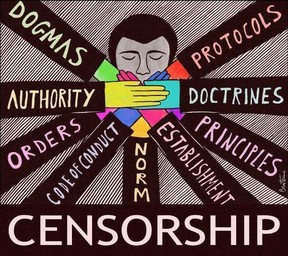 When the Friends of Voltaire needed a way to sum up the philosopher's stance on a controversial issue, they came up with the perfect line.
When the Friends of Voltaire needed a way to sum up the philosopher's stance on a controversial issue, they came up with the perfect line.
'Je désapprouve ce que vous dites, mais je me battrai jusqu'à la mort pour que vous ayez le droit de le dire.' It's usually attributed to Voltaire himself, but it was said about him; and about the way he thought.
It's usually translated as, 'I disagree with what you say, but I will defend to the death your right to say it.'
Freedom of Speech is very easy to defend, when those opinions expressed chime with your own worldview. It's when the 'opposition' get to speak too that distaste can turn into a wish to silence them.
I learned this lesson as a young student on the steps of a town hall, back in the 1990s. As a member of the Anti-Nazi League, I was working to combat racism and other expressions of hatred.
The far right British National Party (BNP) had a candidate standing in the local council elections. A coachload of us turned up to picket the steps into the forum, where each of the candidates would be addressing members of the public. Our remit felt so correct, as we left the University. We were to stop the 'Nazi' entering that hall.
He turned up, in his suit and tie, looking every inch the respectable gentleman. We crowded into his pathway, screaming Anti-Nazi slogans at him. He stood undaunted before our masses.
"You're trying to stop my freedom of speech. You're trying to silence a dissenting voice; and you call me a 'Nazi'." He said. For most of my peers, that was their cue to yell at him about his racist policies. For me, it was a wake up call.
What on Earth was I doing here? I was the only history student there. I was the only one who was in the process of studying, at graduate level, the rise of the Third Reich. I knew the reality behind our chants, our placards and our slogans.
He was right. In our bid to focus on the issue at hand, we'd missed the bigger picture. We'd become the very thing that we sought to challenge.
Watching the backlash against Westboro Baptist Church now reminds me of standing on those town hall steps.


 When the Friends of Voltaire needed a way to sum up the philosopher's stance on a controversial issue, they came up with the perfect line.
When the Friends of Voltaire needed a way to sum up the philosopher's stance on a controversial issue, they came up with the perfect line.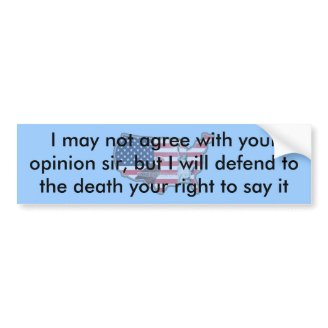
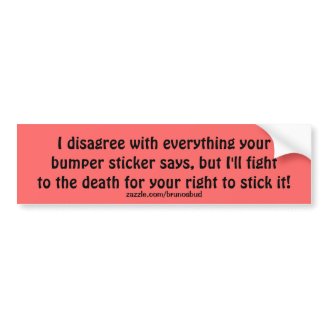
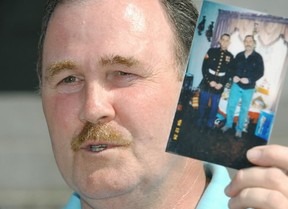 To my mind, there is no real defense for the message and actions of the Westboro Baptist Church. Every syllable of it is repellant to me. Every second of their protest raises the gall in my throat.
To my mind, there is no real defense for the message and actions of the Westboro Baptist Church. Every syllable of it is repellant to me. Every second of their protest raises the gall in my throat.


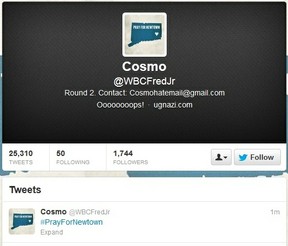 It would be hypocritical of me to say that I haven't thrilled to the backlash against the Westboro Baptist Church. In fact, I've warmed to the wry observation that it's the closest to societal unity that I've ever experienced.
It would be hypocritical of me to say that I haven't thrilled to the backlash against the Westboro Baptist Church. In fact, I've warmed to the wry observation that it's the closest to societal unity that I've ever experienced.



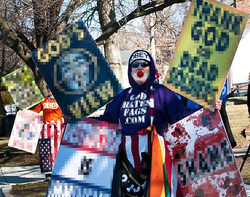

 St Tydecho's Churches in West Waleson 09/03/2014
St Tydecho's Churches in West Waleson 09/03/2014
 Goodies for an Outlander Premiere Partyon 03/06/2015
Goodies for an Outlander Premiere Partyon 03/06/2015
 Holocaust Memorial Day Interview with Rainer Höss, Grandson of Rudolf Architect of Auschwitzon 01/24/2015
Holocaust Memorial Day Interview with Rainer Höss, Grandson of Rudolf Architect of Auschwitzon 01/24/2015
 Romantic Valentine Gifts for an Outlander Fanon 01/16/2015
Romantic Valentine Gifts for an Outlander Fanon 01/16/2015

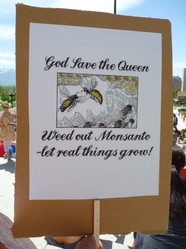
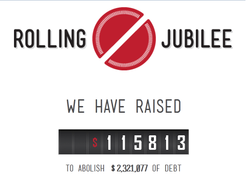
Comments
John Stuart Mill was definitely onto something.
You're right on the latter too. But I also think that 'politically correct' has been diverted into being a bad thing. There are those who express bigotry, but call it honesty and justify it as 'not being politically correct'. Like bigotry is better.
I don't think I've explained that very well. It's been a hard day and I'm tired. But I hope I got the general essence across.
John Stuart Mill had it right, as he argued that the only reason to interfere with liberty is to prevent harm to others. Mill believed that speech should be as free as possible, as this way issues were brought to light. His philosophy is that argument is better than suppression of ideas, as it fosters understanding and enables truth to be clarified. Suppression of speech makes for an intellectually sterile society, he thought.
I think that certain people will accuse their opponents of hate speech, even if there is legitimate disagreement and no hate has been expressed or incitement to hatred made. This has been a common tactic among the poltiically correct. It is totalitarianism masquerading as egalitarianism.
It really is a hard one to call. I'd personally love for everyone who doesn't share my views to be silenced forever. Because they're wrong. But should that actually become a reality, I'd be the first out there defending their right not to be silenced.
But then you have to assume that everyone listening has the ability to tease opinions from facts, and see through clever words designed to make things look good or bad. Unfortunately that kind of discernment isn't wide-spread.
I love what you're doing encouraging civilized debate though.
I agree with AlanB's comments that there is a lot of gray area.
I think that I personally see freedom of speech as something that has reasonable limits. On the other hand, I'd rather people deal with problematic forms of speech by ways other than law enforcement.
One problem I see with groups that persistently promote hate speech and other negative extremist speech, is that I think they are given too much media attention, and thus too much power. If people didn't write about them, they'd quickly become marginalized. (Note, I'm not even referring to them by name, which illustrates how I'd like other people to treat them too.)
One of the reasons I co-founded the group Why This Way, is that I wanted to promote more respectful dialogue in society as a whole, and I wanted to create a system that would promote respectful dialogue through consensus building and establishment of a positive culture of respect and listening. I'm hoping that this group and its ideas, and other groups and movements like it can help address problems like the ones you discuss in this article, without the need for invoking laws and courts and such.
I personally think that when the law and court system becomes involved, it's a sign that things have gone too far for me. I'd rather we find ways to address the problem before it gets to that point. I'd ideally like to live in a society where respect and positivity is the norm, and where hate speech is largely ignored, and people reach out to give help to the people engaging in it rather than amplifying their message and attacking them in turn, as often happens in our society. I think it's possible to overcome these sorts of things by a combination of filtering out the hate speech and focusing on building a culture of positivity and respect.
What saved WBC in the Supreme Court was that their message wasn't deemed a personal attack. Mr Snyder had been representative of a military man, not an individual. That kept it all at the level of civil protest and away from the realms of slander.
Different laws govern slander. Those are the laws which should also take down bullies on Facebook (and everywhere else, most definitely in the playground). Emphasis on the 'should' there.
The First Amendment protected political, civil and cultural discord. I don't believe either that it was there to shield personal attacks. But if we're talking about emotional level harm, then Mitt Romney, Sarah Palin, the NRA, Fox News and a whole host of other people should be forced to shut up. They're causing me emotional harm.
As you said, it's a sticky matter and well worth the debate here.
This is a very sticky matter, indeed. However, what about other areas of 'Free Speech'? For example, bullying on Facebook that lead some to suicide. Are the bullies not expressing their free speech? We try to make everything seem black and white in this world, but they're not. I don't think the intentions of the 1st Amendment of the Constitution was to protect people that used speech to inflict harm and pain on other people. Is WBC's practice of free speech harmful? I've never encountered them personally, but I think that the people that have are probably harmed by their speech; even if it's just on an emotional level.
But these are the fascinating questions that are being raised by the Westboro Baptist Church situation. Freedom of Speech would be so easy, if everyone agreed on what was being said.
I detest all that WBC stand for, but if I want Freedom of Speech, then they have to have it too. I just wish that they would shut up.
Before we can even discuss how to enforce responsibility, we have to determine what we mean by responsible Freedom of Speech. I know many fox hunting groups who want me to shut up too. Ditto human rights abusers. We're all going to have a different idea of what constitutes the right to speech, as soon as we draw such lines in the sand.
I agree with freedom of speech but i also feel rights need to be balanced against responsibilities - because someones rights will always impact on somebody elses. How you enforce people taking responsibility? Now thats a whole new question
I'm mixed on this one. In Britain, we do have laws against hate speech. Members of the Westboro Baptist Church are banned from entering my country accordingly.
But I'm of the opinion that arguments and views, which aren't good, die more quickly in the spotlight than in the shadows. There's too much mystery attached to those being silenced.
I recall once picking up my nephews for a visit to my house. It was voting day, so I commented, "If you don't mind, I need to nip to the voting booth on the way up." My youngest nephew, who was about 13-14 at the time, responded, "Ok, but only if you vote BNP."
I nearly had a heart-attack on the spot!
It did turn out that he was trolling me, but his reasoning was sound. He'd heard so much about the other parties, but whenever the BNP was mentioned, it was all 'they're bad' and no further information. He found himself curious, because they alone weren't afforded television time. No newspaper reported them. The adults around him just wrinkled up their noses and dismissed them as a hate group. He was being told to hate a party of which he knew nothing.
Should people have the right to demand the deaths of others? Absolutely not. But they should be arrested under intent to kill laws, rather than freedom of speech/hate speech laws.
"Either everyone has freedom of speech, or nobody does." Yes and no, would agree that a group that demands that people with xyz color, sex, gender orientation has to be killed has the right to say so? Opinion is one thing, hate another. My freedom stops there where it limits the freedom of another person - not sure who said this, but this is basically the boundary I see. SY